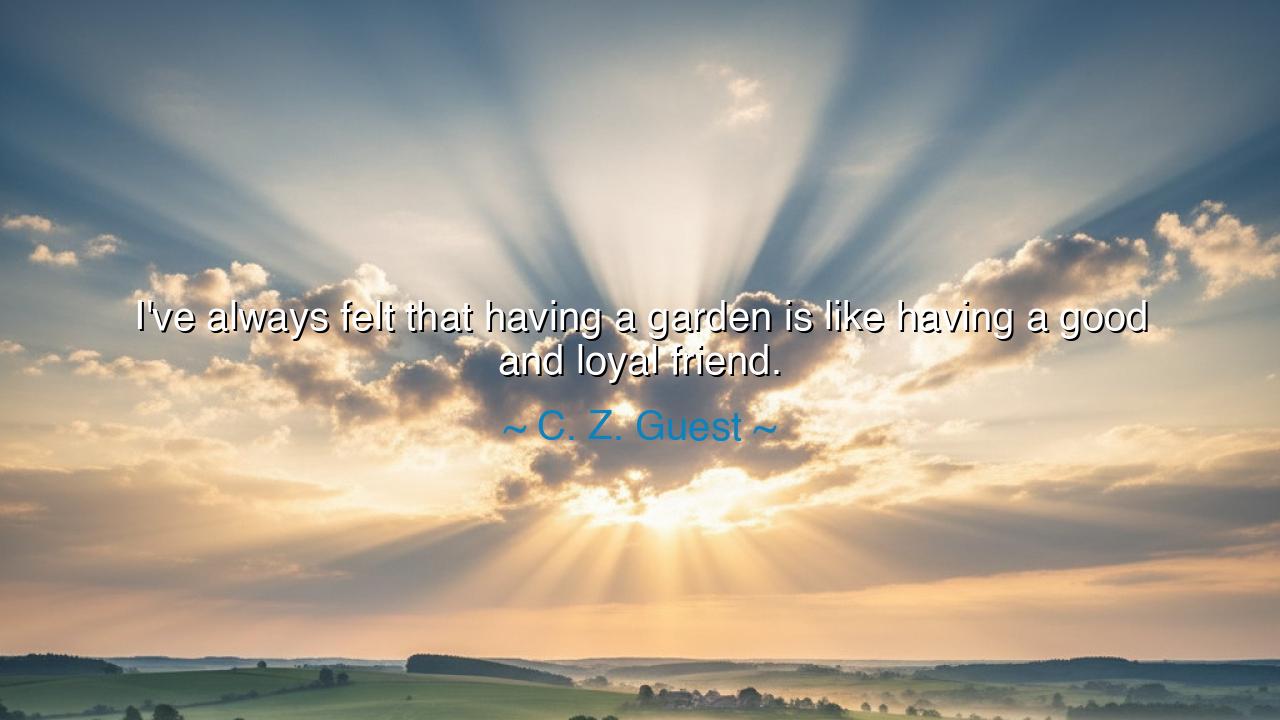
I've always felt that having a garden is like having a good and






In the eternal dance between humanity and nature, there lies a deep, quiet bond that many have discovered through the ages—a bond between the gardener and the garden, one that transcends mere cultivation. C. Z. Guest eloquently captures this connection when she says, "I've always felt that having a garden is like having a good and loyal friend." These words resonate with an ancient truth, one that echoes in the wisdom of the ages: the garden, like a true companion, offers not only beauty and sustenance but a sense of steadfast support and unwavering loyalty. To have a garden is to have a friend who is ever-present, ever-giving, and ever-growing alongside you, a constant presence in the landscape of life.
The ancients understood the sacred bond between humans and nature. The Greeks believed that the earth itself was a living entity, one that provided not only sustenance but also guidance and wisdom. The goddess Demeter, keeper of the harvest, was revered not only for her ability to grow crops but for the wisdom she imparted through the very act of growth. The garden, in this sense, was seen as a reflection of the divine, a place where the labor of the gardener was met with the gifts of nature. To tend to the earth was to enter into a relationship—one of mutual respect, where both the gardener and the garden grew in tandem. C. Z. Guest’s words capture this ancient connection, for a garden, like a true friend, offers its support without demand and rewards the gardener with love and trust.
In the same vein, the Romans believed deeply in the relationship between humans and the land. They saw the garden as a sanctuary, a space for both physical nourishment and spiritual renewal. The Roman poet Virgil, in his work Georgics, praised the life of the gardener, noting that the work of the land was not just a physical act but a spiritual one. The gardener, in this context, was seen as a partner with nature, one who gave and received in equal measure. Much like C. Z. Guest's reflection, the garden became a loyal companion, offering its gifts freely, but only in return for consistent care and attention. The gardener did not simply control the earth; they worked with it, understanding that the garden’s rewards were rooted in trust and understanding.
The relationship between the gardener and the garden is one of mutual growth. It is a bond that mirrors the ancient wisdom of Taoism, which teaches that life is about balance and harmony. The Tao Te Ching, written by the sage Laozi, speaks of the importance of living in harmony with nature, understanding that the natural world offers us its gifts without expectation, and that our responsibility is to reciprocate with respect and care. Laozi writes, “The earth is our great mother, she sustains all things. If we live in harmony with the earth, she will nourish us.” This is the same harmony that C. Z. Guest refers to when she compares the garden to a loyal friend—a relationship based not on dominance, but on mutual respect and companionship.
The wisdom of the garden is not just in its fruits and flowers but in its lessons of patience, commitment, and trust. Just as a loyal friend is there through the seasons of life, so too is the garden. It is not a fleeting relationship, but one that requires dedication. The gardener must give of themselves—sometimes through laborious effort, other times through the simple act of observation and nurturing. And in return, the garden, like a faithful friend, offers its beauty, its quiet companionship, and its rewards, both tangible and intangible. This bond between gardener and garden is often compared to friendship in literature, where the garden is seen as a constant, unyielding companion, offering solace in times of sorrow and joy in times of celebration.
Consider the example of Thomas Jefferson, the third President of the United States, who, in addition to his political achievements, was an avid gardener. His garden at Monticello was not merely a space for growing food but a profound expression of his personal philosophy. Jefferson believed that a garden was a reflection of the human spirit—a space where one could cultivate not just plants, but character. He spent countless hours tending to his garden, and it was there that he found peace, much like a person finds solace in the companionship of a trusted friend. Jefferson’s garden was his sanctuary, a place where he could reflect, grow, and, in many ways, heal. His relationship with his garden was one of respect and loyalty, and it served him as a friend does, offering unwavering support through the seasons of his life.
Thus, we are reminded that the garden, like a loyal friend, offers more than just its outward beauty. It provides a space for reflection, growth, and renewal—a space where we can come to understand ourselves and the world around us. The lesson here is one of mutual respect. Like a true friend, the garden asks for our care, attention, and love in return for its rewards. It teaches us the value of patience, the importance of nurturing, and the understanding that life’s beauty is often found in the steady, quiet work of tending to what we hold dear. Let us then tend our gardens as we would tend our dearest friends, with love, respect, and a deep commitment to the growth of both. In doing so, we cultivate not just flowers and fruits, but the very essence of peace, joy, and fulfillment.






AAdministratorAdministrator
Welcome, honored guests. Please leave a comment, we will respond soon